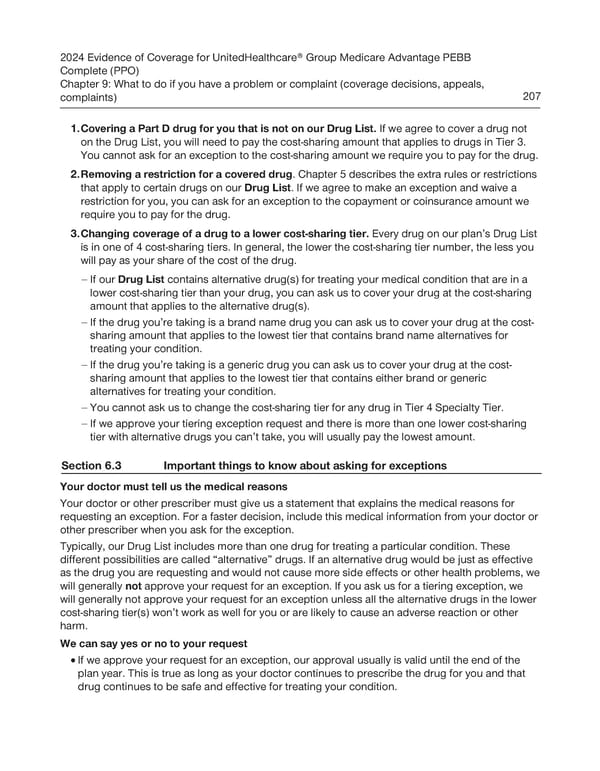2024 Evidence of Coverage for UnitedHealthcare® Group Medicare Advantage PEBB Complete (PPO) Chapter 9: What to do if you have a problem or complaint (coverage decisions, appeals, complaints) 207 1. Covering a Part D drug for you that is not on our Drug List. If we agree to cover a drug not on the Drug List, you will need to pay the cost-sharing amount that applies to drugs in Tier 3. You cannot ask for an exception to the cost-sharing amount we require you to pay for the drug. 2. Removing a restriction for a covered drug. Chapter 5 describes the extra rules or restrictions that apply to certain drugs on our Drug List. If we agree to make an exception and waive a restriction for you, you can ask for an exception to the copayment or coinsurance amount we require you to pay for the drug. 3. Changing coverage of a drug to a lower cost-sharing tier. Every drug on our plan’s Drug List is in one of 4 cost-sharing tiers. In general, the lower the cost-sharing tier number, the less you will pay as your share of the cost of the drug. - If our Drug List contains alternative drug(s) for treating your medical condition that are in a lower cost-sharing tier than your drug, you can ask us to cover your drug at the cost-sharing amount that applies to the alternative drug(s). - If the drug you’re taking is a brand name drug you can ask us to cover your drug at the cost- sharing amount that applies to the lowest tier that contains brand name alternatives for treating your condition. - If the drug you’re taking is a generic drug you can ask us to cover your drug at the cost- sharing amount that applies to the lowest tier that contains either brand or generic alternatives for treating your condition. - You cannot ask us to change the cost-sharing tier for any drug in Tier 4 Specialty Tier. - If we approve your tiering exception request and there is more than one lower cost-sharing tier with alternative drugs you can’t take, you will usually pay the lowest amount. Section 6.3 Important things to know about asking for exceptions Your doctor must tell us the medical reasons Your doctor or other prescriber must give us a statement that explains the medical reasons for requesting an exception. For a faster decision, include this medical information from your doctor or other prescriber when you ask for the exception. Typically, our Drug List includes more than one drug for treating a particular condition. These different possibilities are called “alternative” drugs. If an alternative drug would be just as effective as the drug you are requesting and would not cause more side effects or other health problems, we will generally not approve your request for an exception. If you ask us for a tiering exception, we will generally not approve your request for an exception unless all the alternative drugs in the lower cost-sharing tier(s) won’t work as well for you or are likely to cause an adverse reaction or other harm. We can say yes or no to your request · If we approve your request for an exception, our approval usually is valid until the end of the plan year. This is true as long as your doctor continues to prescribe the drug for you and that drug continues to be safe and effective for treating your condition.
 UnitedHealthcare PEBB Complete EOC (2024) Page 212 Page 214
UnitedHealthcare PEBB Complete EOC (2024) Page 212 Page 214